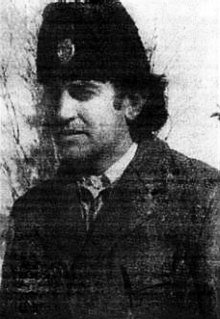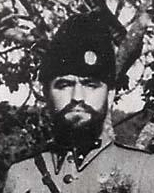 W
WThe Chetniks, a Yugoslav Royalist and Serbian nationalist movement and guerrilla force, committed numerous war crimes during the Second World War, primarily directed against the non-Serb population of the Kingdom of Yugoslavia, mainly Muslims and Croats, and against Communist-led Yugoslav Partisans and their supporters. Most historians who have considered the question regard the Chetnik crimes against Muslims and Croats during this period as constituting genocide.
 W
WPetar Baćović was a Bosnian Serb Yugoslav reserve army officer, lawyer, and then a Chetnik commander within occupied Yugoslavia during World War II. From the summer of 1941 until April 1942, he headed the cabinet of the Ministry of Internal Affairs for Milan Nedić's puppet Government of National Salvation in the German-occupied territory of Serbia. In May and June 1942, Baćović participated in the joint Italian-Chetnik offensive against the Yugoslav Partisans in Montenegro In July 1942, Baćović was appointed by the Chetnik leader Draža Mihailović and his Supreme Command as the commander of the Chetnik units in the regions of eastern Bosnia and Herzegovina within the Axis puppet state, the Independent State of Croatia. In this role, Baćović continued collaborating with the Italians against the Yugoslav Partisans, with his Chetniks formally recognised as Italian auxiliaries from mid-1942.
 W
WThe Blessed Martyrs of Drina are the professed Sisters of the Congregation of the Daughters of Divine Charity, who lost their lives during World War II. Four were killed when they jumped out of a window in Goražde on 15 December 1941, reportedly to avoid being raped by Chetniks, and the last was killed by the Chetniks in Sjetlina the following week. The five nuns were later declared martyrs and beatified by Pope Benedict XVI on 24 September 2011.
 W
WThe Chetniks, formally the Chetnik Detachments of the Yugoslav Army, and also the Yugoslav Army in the Homeland and the Ravna Gora Movement, was a Yugoslav royalist and Serbian nationalist movement and guerrilla force in Axis-occupied Yugoslavia. Although it was not a homogeneous movement, it was led by Draža Mihailović. While it was anti-Axis in its long-term goals and engaged in marginal resistance activities for limited periods, it also engaged in tactical or selective collaboration with the occupying forces for almost all of the war. The Chetnik movement adopted a policy of collaboration with regard to the Axis, and engaged in cooperation to one degree or another by establishing modus vivendi or operating as "legalised" auxiliary forces under Axis control. Over a period of time, and in different parts of the country, the movement was progressively drawn into collaboration agreements: first with the puppet Government of National Salvation in the German-occupied territory of Serbia, then with the Italians in occupied Dalmatia and Montenegro, with some of the Ustaše forces in northern Bosnia, and, after the Italian capitulation in September 1943, with the Germans directly.
 W
WJezdimir Dangić was a Yugoslav and Bosnian Serb Chetnik commander during World War II. He was born in the town of Bratunac in the Austro-Hungarian occupied Bosnia Vilayet of the Ottoman Empire. Imprisoned during World War I for his membership of the revolutionary movement Young Bosnia, he subsequently completed a law degree and became an officer in the gendarmerie of the Kingdom of Serbs, Croats and Slovenes at the beginning of 1928. In 1929, the country changed its name to the Kingdom of Yugoslavia. In 1940, Dangić was appointed to lead the court gendarmerie detachment stationed at the royal palace in the capital, Belgrade. During the Axis invasion of Yugoslavia in 1941, Dangić commanded the gendarmerie unit that escorted King Peter II to Montenegro as he fled the country. In August of that year, the leader of the Chetnik movement, Colonel Draža Mihailović, appointed Dangić as the commander of the Chetnik forces in eastern Bosnia. Here, Dangić and his men launched several attacks against the forces of the Independent State of Croatia. Soon after his appointment, Dangić's Chetniks captured the town of Srebrenica from the occupiers. Afterwards, they became largely inactive in fighting the Germans, choosing instead to avoid confrontation. In December, Chetniks under Dangić's command massacred hundreds of Bosnian Muslims in the town of Goražde. In the same month, his Chetniks captured five nuns and took them with them through Romanija to Goražde, where they later committed suicide to avoid being raped.
 W
WMomčilo Đujić was a Serbian Orthodox priest and Chetnik warlord. He led a significant proportion of the Chetniks within the northern Dalmatia and western Bosnia regions of the Independent State of Croatia (NDH), a fascist puppet state created from parts of the occupied Kingdom of Yugoslavia during World War II. In this role he collaborated extensively with the Italian and then the German occupying forces against the communist-led Partisan insurgency.
 W
WPavle Đurišić was a Montenegrin Serb regular officer of the Royal Yugoslav Army who became a Chetnik commander (vojvoda) and led a significant proportion of the Chetniks in Montenegro during World War II. He distinguished himself and became one of the main commanders during the popular uprising against the Italians in Montenegro in July 1941, but later collaborated with the Italians in actions against the Communist-led Yugoslav Partisans. In 1943, his troops carried out several massacres against the Muslim population of Bosnia, Herzegovina and the Sandžak, and participated in the anti-Partisan Case White offensive alongside Italian forces. Đurišić was captured by the Germans in May 1943, escaped and was recaptured.
 W
WThe Gata massacre was the murder of 96 villagers in the Croatian village of Gata in 1942. The perpetrators of this massacre were members of the Dinara Chetnik Division, under the leadership of Chetnik Commanders (vojvoda) Petar Baćović, Momčilo Đujić and Mane Rokvić.
 W
WDobroslav Jevđević was a Bosnian Serb politician and self-appointed Chetnik commander in the Herzegovina region of the Axis-occupied Kingdom of Yugoslavia during World War II. He was a member of the interwar Chetnik Association and the Organisation of Yugoslav Nationalists, a Yugoslav National Party member of the National Assembly, and a leader of the opposition to King Alexander between 1929 and 1934. The following year, he became the propaganda chief for the Yugoslav government.
 W
WThe Krnjeuša massacre, sometimes referred to as the Krnjeuša pogrom, was a massacre of civilians committed by local Serb rebels led by Mane Rokvić on 9-10 August 1941, during the Drvar uprising.
 W
WThe Kulen Vakuf massacre was committed during World War II by Communist-led Yugoslav Partisans and groups of non-communist Serbs, killing 1,000 to 3,000 Muslims and Ustaše members in early September 1941 in Kulen Vakuf, part of the Independent State of Croatia. The local Ustaše had previously massacred Serbs in Kulen Vakuf and surrounding villages.
 W
WOperation Alfa was an offensive carried out in early October 1942 by Italian, Croatian and Chetnik forces against the communist-led Partisans in the Prozor region, then a part of the Croatian puppet state, the Independent State of Croatia (NDH). The operation was militarily inconclusive, and in the aftermath, Chetnik forces conducted mass killings of civilians in the area.